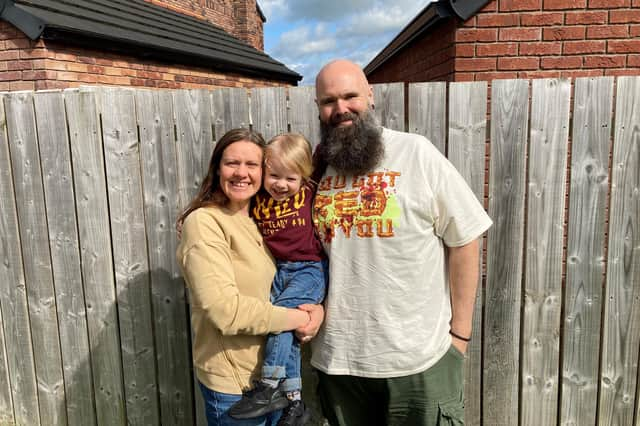NI stroke survivor: It’s vital that thrombectomy is available to those in need


Paul Mclean from Magheralin had a stroke one Saturday morning in June 2016 while he was at home with his wife Suzanne.
“I suddenly noticed that I couldn’t move my right hand. I was trying to show Suzanne something but couldn’t lift my hand to point. I tried to speak but she was just staring back at me blankly. I didn’t realise that my face had drooped and my speech was slurred. In my head I was speaking perfectly clearly but she couldn’t understand. Suzanne did the FAST (Face, Arms, Speech, and Time) test and rang an ambulance.
Advertisement
Hide AdAdvertisement
Hide AdPaul,46, said: “I am so grateful to the ambulance team for blue-lighting me straight to the Royal Victoria Hospital in Belfast. Thankfully I was eligible for a thrombectomy which saved my life.”
A thrombectomy is a revolutionary procedure which involves inserting a small tool into the brain to remove the blood clot causing the stroke.
The doctor advised Paul’s wife Suzanne there was probably about a 10 percent chance Paul would survive the surgery. But within three hours the consultant returned with the good news that the clot had been removed at the first attempt!
The main side effects of Paul’s stroke are extreme fatigue and aphasia, difficulties with communication.
Advertisement
Hide AdAdvertisement
Hide AdHe said: “At first I couldn’t really speak at all. I had a few words and could say my name but that was about it. It was really scary. It was all very confusing and my brain wasn’t able to function properly.
“It took me a long time to process what had happened. Back at the start the thought of not being able to chat to my wife or friends again was terrifying.
“Slowly but surely more words came back but it’s taken a long time and I’m still relearning some words and phrases. I’ve had to teach myself how to read again by listening to audio books and reading along. In those early days the Stroke Association’s Communication Plus speech and language therapy group really helped me get my confidence back.”
Paul added: “Thanks to stroke research, that day thrombectomy saved my life. I know from my experience, it’s vital that thrombectomy is available all the time for anyone who needs it. Since becoming a dad to our son Lorcan, I honestly believe it’s helped my stroke recovery. He’s nearly two and a half now and he just doesn’t stop. He’s always getting me to find new words - new ways to explain things and that’s really helped my own speech.
Advertisement
Hide AdAdvertisement
Hide Ad“I’ve definitely come out of my shell a little bit more too. He’s just a wee star.”
According to the Stroke Association more than half of the NI public don’t know that stroke is the fourth biggest killer in the UK. The charity has released the survey findings as it calls for vital support to fund more research into the devastating condition.
A stroke happens when the blood supply to part of the brain is cut off, killing brain cells. The charity’s latest study asked the general public to rank health conditions in order of the leading causes of death. Fifty-one per cent of people who ranked stroke placed it below its actual position as the fourth biggest killer.
The research also revealed that almost a fifth of people (18%) underestimate the impact of stroke, believing that stroke ranks lower than its actual position as the fifth leading cause of disability (and death combined) in the UK. In fact, two thirds of people who survive a stroke find themselves living with a disability.
Advertisement
Hide AdAdvertisement
Hide AdDr Niamh Kennedy, lecturer of Psychology at Ulster University, said: “Over the last four years I have conducted research talking to hundreds of stroke survivors, their families and healthcare professionals working in stroke across Northern Ireland.
From this it can be seen that although aspects of our hospital care is considered to be very good, there is a great need for better long-term support after stroke.
“Stroke survivors report feeling abandoned when they leave hospital, with families left to deal with the lifelong effects of stroke without adequate support or treatment.
“We need to adequately fund stroke research to help us to save lives, reduce disability and provide the best long-term support after stroke.
Advertisement
Hide AdAdvertisement
Hide Ad“Stroke research can not only help us reduce the number of strokes and help prevent disability after a stroke, but can also help us understand how best to support the over 39,000 stroke survivors in Northern Ireland.”
Alasdair O’Hara, associate director at the Stroke Association in Northern Ireland, said: “Our pioneering research has been at the centre of major breakthroughs that have saved lives and sparked innovation in stroke care and treatment.
“From laying the foundations for the Act FAST campaign, to funding early research into the emergency stroke treatment thrombectomy (the manual removal of stroke-causing blood clots), many patients have been spared the most devastating effects of stroke as a result of our research.”
Donate to help fund the research that could mean everything to stroke survivors and their loved ones.
Visit www.stroke.org.uk/ supportresearch
Comment Guidelines
National World encourages reader discussion on our stories. User feedback, insights and back-and-forth exchanges add a rich layer of context to reporting. Please review our Community Guidelines before commenting.